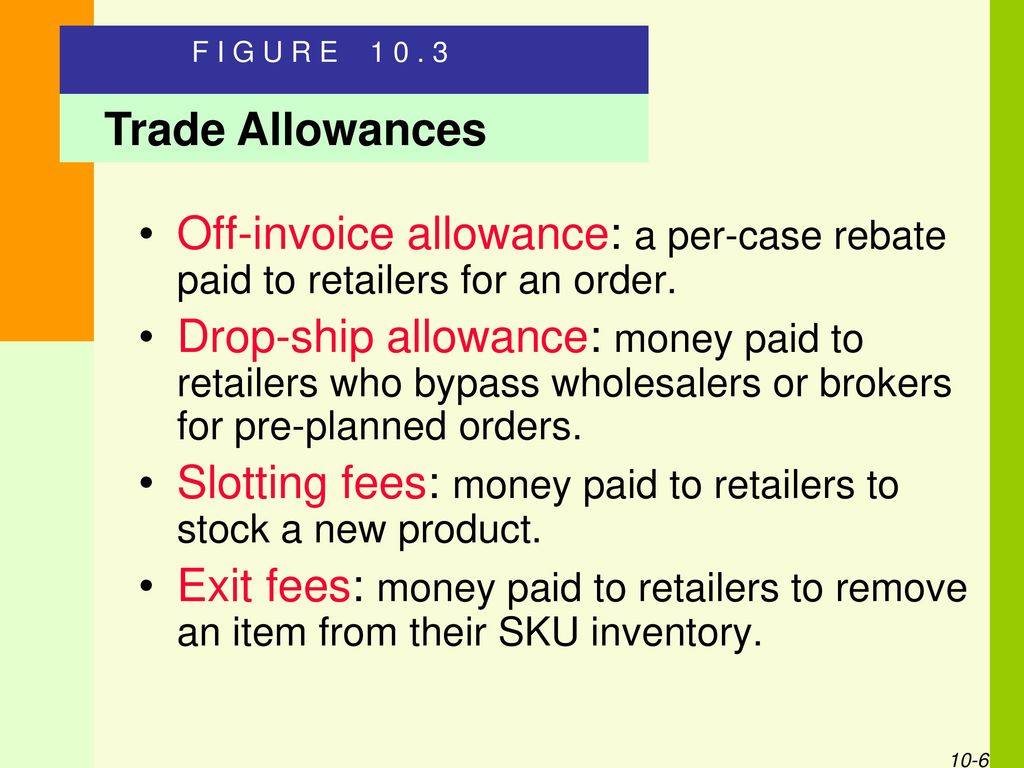A Slotting Fee Is A Form Of

A slotting fee, slotting allowance,[1]pay-to-stay, or fixed trade spending[2] is a fee charged to produce companies or manufacturers by supermarket distributors (retailers) in order to have their product placed on their shelves.[3] The fee varies greatly depending on the product, manufacturer, and market conditions. For a new product, the initial slotting fee may be approximately $25,000 per item in a regional cluster of stores, but may be as high as $250,000 in high-demand markets.[4]
In addition to slotting fees, retailers may also charge promotional, advertising and stocking fees. According to an FTC study, the practice is 'widespread' in the supermarket industry.[5] Many grocers earn more profit from agreeing to carry a manufacturer's product than they do from actually selling the product to retail consumers. Fees may serve to efficiently allocate scarce retail shelf space, help balance the risk of new product failure between manufacturers and retailers, help manufacturers signal private information about potential success of new products, and serve to widen retail distribution for manufacturers by mitigating retail competition.[6] For vendors, slotting fees may be a move by the grocery industry to profit at their suppliers' expense.[7]

Some companies argue that slotting fees are unethical as they create a barrier to entry for smaller businesses that do not have the cash flow to compete with large companies. The use of slotting fees can, in some instances, lead to abuse by retailers such as in the case where a bakery firm was asked for a six figure fee to carry its items for a specific period with no guarantee its products would be carried in future periods.[8]
The same practice is common in major bookstore chains in the US as well, as far back as the mid-nineties.[9]

Negotiating on Retail Slotting Fees. Retailers charge their suppliers slotting fees to secure a place on their shelves. If you're in the process of getting your first product into a major store, you'll need to be ready to negotiate these fees when you agree on pricing. Slotting fee definition is - a fee charged by a vendor in exchange for carrying a manufacturer's product —called also slotting allowance.
- Displaying 1 - 1 of 1 results. Workshop on Slotting Allowances and Other Grocery Marketing Practices Slotting allowances are the lump-sum, up-front payments that manufacturers of food items often pay in order to get new products on supermarket shelves.
- Marketing Sci.11(4, Fall) 327–347.) have assumed that slotting fees arise as manufacturers respond to retailer demands. Here, the manufacturer willingly offers an allowance. As a consequence, slotting allowances do not represent a windfall for the retailer; he merely breaks even on a product for which a slotting allowance is paid.
Slotting Fees Disadvantages
References[edit]
- ^'The Use of Slotting Allowances in the Retail Grocery Industry Federal Trade Commission'(PDF). Ftc.gov. 2003-11-14. Retrieved 2015-08-18.
- ^'H.J. Heinz Company and Milnot Holding Corp Federal Trade Commission'(PDF). Ftc.gov. Retrieved 2015-08-18.
- ^Sparks, Brian. 'Slotting fee battle continues.' American Fruit Grower. January, 2001. Retrieved on August 1, 2006.
- ^Copple, Brandon. 'Shelf-Determination.' Forbes. April 15, 2002. Retrieved on August 1, 2006.
- ^'FTC Releases Grocery Industry Slotting Allowance Report'. Federal Trade Commission. 2003-11-14. Retrieved 2020-01-17.
- ^Innes, Robert; Hamilton, Stephen F. (2013). 'Slotting Allowances under Supermarket Oligopoly'. American Journal of Agricultural Economics. 95 (5): 1216–1222. doi:10.1093/ajae/aat023. ISSN0002-9092. JSTOR24476902.
- ^Aalberts, Robert J.; Jennings, Marianne M. (1999). 'The Ethics of Slotting: Is This Bribery, Facilitation Marketing or Just Plain Competition?'. Journal of Business Ethics. 20 (3): 207–215. doi:10.1023/A:1006081311334. ISSN0167-4544. JSTOR25074132.
- ^[1]Archived April 2, 2010, at the Wayback Machine
- ^In Bookstore Chains, Display Space Is for SaleNew York Times. January, 1996. Retrieved on August 22, 2012.

WASHINGTON (Dow Jones) —Lawmakers and competition regulators have taken a renewed interest in the growing number of slotting fees dominant grocers charge food manufacturers to carry their products, as supermarkets have begun to levy such charges on everything from processed foods to produce.p. On Thursday, the Senate Small Business Committee is expected to hear from produce growers and agriculture experts about the competitive effect of such fees on small farmers and consumers. The Federal Trade Commission has an ongoing investigation into slotting fees and held a workshop on the matter earlier this year.p. “This issue needs a thorough disinfectant dose of sunshine,” said Sen. Kit Bond, R-Mo., the chairman of the committee and a former antitrust lawyer, in an interview.p. The lawmaker said he has been encouraging the antitrust authorities, including the Department of Justice’s competition branch, to look into allegations that the fees charged by grocers, which account for much of the retailer’s revenue, are eventually costing consumers.p. “There’s a fear that large dominant retailers and large dominant manufacturers might be using the fees to hurt competition and hurt consumers,” saidProf. Gregory Gundlach, a marketing expert at theUniversity of Notre Damein Indiana.p. The fees originally evolved as a way to shift some of the risk burden of stocking new product lines away from the retailers and to the manufacturers of the goods, since most new products fail, according to John Stanton, a professor of food marketing at St. Joseph’s University in Philadelphia. He estimates that large supermarket chains bring in between 50% and 75% of their revenue from manufacturers’ placement fees, giving them greater incentive to maintain the relationship. Manufacturers don’t challenge the demands because supermarket chains are their principle customers, reasons the professor.p. The legal questions surrounding the use of slotting fees cause angst for competition regulators. Antitrust authorities hesitate to challenge slotting arrangements because proponents of the practice argue they promote efficiencies. Retailers see slotting fees as a form of insurance against wasted shelf space if a product doesn’t sell.p. “The antitrust laws have always struggled with this and so have the antitrust agencies,” said David Balto, a lawyer at the FTC who is heading the agency’s efforts on the matter.p. But the relatively recent evolution of slotting fees for fruits and vegetables has piqued the interest of antitrust authorities, as farmers, dairy producers and cattlemen have begun to complain that consumers are paying more for their products even as they receive less money from the retailers.p. “There’s an increasing number of slotting fees in the produce aisle, and that just doesn’t make sense,” said the FTC’s Balto. The “insurance” argument retailers use doesn’t seem to apply as simply to produce, food growers say. “An onion is an onion,” Balto said, “There’s nothing new about that.”p. Any harm to consumers, experts say, comes in the form of potentially higher prices and diminishing choice as retailers favor only the dominant food manufacturers.p. “Some retailers view the fees as profit centers, and therein lies the problem,” said Prof. Gundlach, 'If the retailer uses an exorbitant fee, but then doesn’t use the fee revenue to benefit consumers, then what you have is consumers paying higher prices for no benefit.p. Wednesday, September 13, 2000
Slotting Fees Definition
TopicID: 307